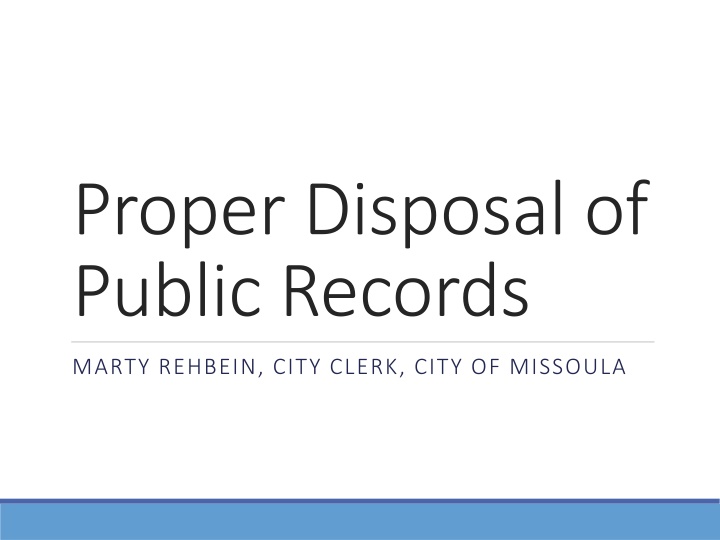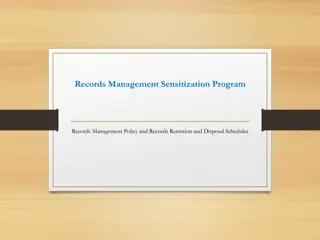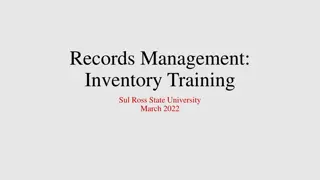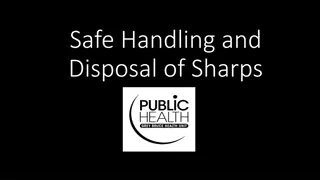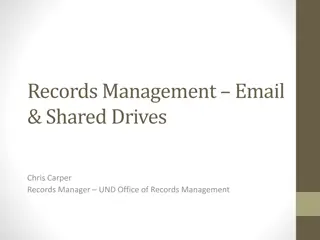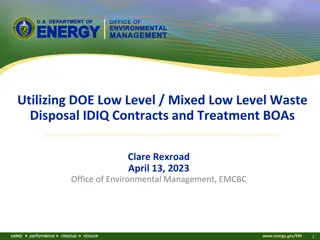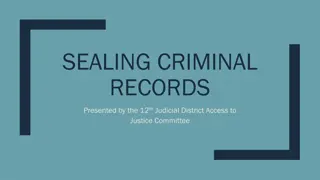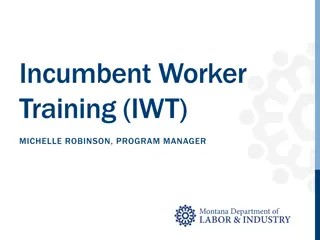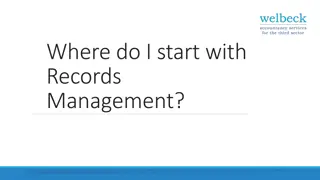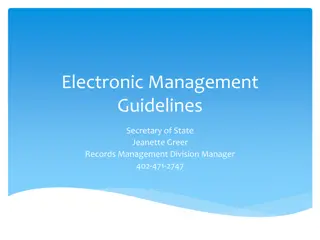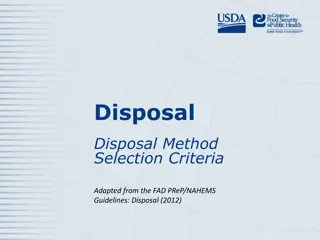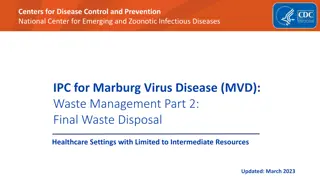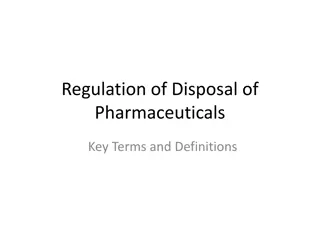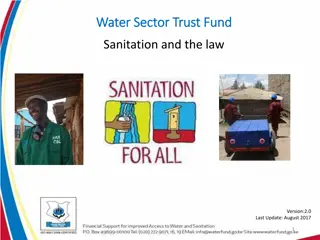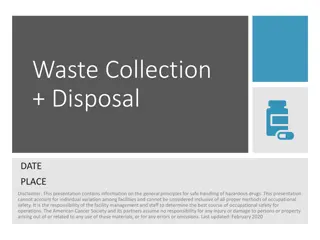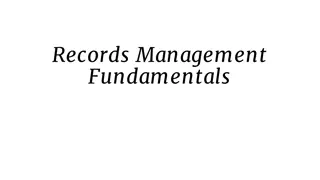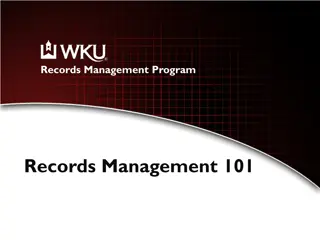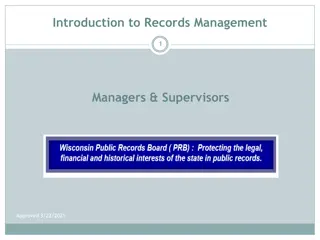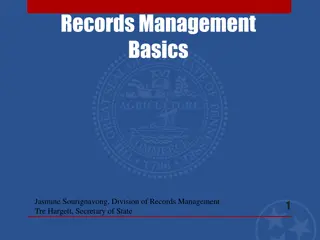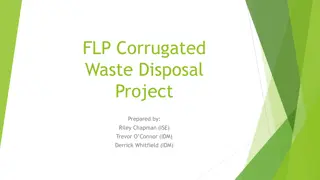Proper Disposal of Public Records Guidelines in Montana
Guidelines for proper management and disposal of public records in local government entities in Montana, outlined under HB 123 passed in 2015. The Local Government Records Committee (LGRC) oversees records retention schedules and reviews disposal requests. Contact LGRC for questions or assistance regarding retention schedules and record disposal processes.
Download Presentation

Please find below an Image/Link to download the presentation.
The content on the website is provided AS IS for your information and personal use only. It may not be sold, licensed, or shared on other websites without obtaining consent from the author.If you encounter any issues during the download, it is possible that the publisher has removed the file from their server.
You are allowed to download the files provided on this website for personal or commercial use, subject to the condition that they are used lawfully. All files are the property of their respective owners.
The content on the website is provided AS IS for your information and personal use only. It may not be sold, licensed, or shared on other websites without obtaining consent from the author.
E N D
Presentation Transcript
Proper Disposal of Public Records MARTY REHBEIN, CITY CLERK, CITY OF MISSOULA
HB 123 Passed by the 2015 Legislature Effective October 1, 2015 Revised public records laws (Title 2, Chapter 6) in Montana for all branches of government include cities and towns Revised rules for proper management and disposal of public records for local government (Title 2, Chapter 6, Part 12)
Definitions Public Information Public Record 2-6-1002 (11) MCA Information prepared, owned, used, or retained by any public agency relating to the transaction of official business, regardless of form, except for confidential information that must be protected against public disclosure under applicable law. 2-6-1002 (13) MCA Public information that is: (a) fixed in any medium and is retrievable in usable form for future reference; and (b) designated for retention by the state records committee, judicial branch, legislative branch, or local government records committee.
Not public records Catalogs, journals and published materials unless they are produced by the local government Copies of bulletins and correspondence prepared for reference or information Notices and memos that do note relate to the agency s functions or responsibilities (community notices, holiday gatherings, etc.) Routing slips While you were out or other forms used to convey non-policy messages Stocks of publications and printed documents that are superseded or updated
Local Government Records Committee (LGRC) Committee charged by state law (2-6-1201 and 1202) to establish records retention schedules for local government units We meet twice a year to approve, modify or disapprove local government retention schedules. We provide technical guidance, education and assistance to local governments about records. We have a subcommittee that reviews record disposal requests. We are developing categories of records that don t need to come to our subcommittee for disposal approval.
Local Government Records Committee (LGRC) Email us: with questions or comments about retention schedules, procedures your record disposal requests to request a change in the retention schedule soslocalgovtreccom@mt.gov Jodie Foley, Montana State Archives, Joe DeFilippis, Secretary of State, Kay Johnson, Blaine County Clerk of the District Court, Bonnie Ramey, Jefferson County Clerk and Recorder, Terry Atwood, Genealogy Representative, Marty Rehbein, Missoula City Clerk, Beth Riitano, State Local Government Services, Keith Belcher, Missoula County Records Manager
Record Retention Schedules Categorizes groups of related records into records series and designates a retention period. http://sos.mt.gov/Records/forms/local/Local_Schedule8.pdf
Office of Record The office in an organization that has the official responsibility to maintain a particular record series. Copies in other offices can be destroyed when no longer needed. They shouldn't be retained longer than the "record copy."
Retention Periods Retention periods are minimums. You must keep the record copy for the length of time listed on the retention schedule. You are not required to dispose of records at the end of the minimum time outlined on a retention schedule. BUT .There is always an exception to every rule, right?
Legal and Regulatory Holds Local government units should not dispose of records subject to litigation, a legal proceeding, an audit and/or a formal investigation, even if the records have met their retention requirements. Disposing of records subject to a legal or regulatory hold can subject your district to court sanctions, adverse rulings and judgements from a court, additional litigation, etc. Consult your legal counsel.
SOS Website Resources The latest and greatest resources needed to dispose of public records! Local Government Records Management page http://www.sos.mt.gov/records/Local/index.asp Disposal Form http://sos.mt.gov/Records/Forms/local/Local_Disposal_Request_Form.d ocx Schedule 8 for cities and towns http://sos.mt.gov/Records/forms/local/Local_Schedule8.pdf Records & Info. Management Toolkit http://www.sos.mt.gov/records/toolkit/index.asp
The 10 Year Rule State law 2-6-1205, MCA: Applies to all records that are over 10 years old SOS places disposal request on a listserv If no one claims them after 60 days, records may be disposed. (See your approved disposal form for date records may be disposed.) If multiple requests are received, consult statute about who has priority. Does not apply to confidential or private records because they may not be released. Central Registry website: http://lists.mt.gov/read/?forum=recordsdisposal
Confidential/Private records The local government unit bears responsibility to determine if records are confidential and should note which records are confidential on each request for disposal. If you have questions, please see the Montana Constitution, Article II, Section 9 and Section 10, Title II statutes at 2-17-553, MCA. Consult legal counsel.
When Records Can Be Disposed Local government units may dispose of records that have met their retention requirements provided they are: not subject to a legal or regulatory hold the disposal is carried out in accordance with federal/state/local laws and a retention schedule approved by the LGRC, and/or a court order
Disposal Form Document the disposal of public records through use of a disposal form. This is your proof you have complied with the requirements for disposal. Available on SOS website: http://sos.mt.gov/Records/Forms/local/Local_Disposal_R equest_Form.docx
Disposal Form Local Gov t Info
Disposal Form Records Info
Disposal Form Local Gov t Approval
Disposal Form LGRC Subcommittee Approval
Disposal Form Central Registry (if req d)
Disposal Procedures Approve at local level by governing body Email or mail disposal request form to LGRC unless there is a specific note on the retention schedule exempting the record series from this requirement. It will say No RM60 required. The LGRC s disposal subcommittee will review the request and send back a response. Electronic signoff by DOA Local Gov t Services, State Archivist, Local Gov t Rep. & SOS office if 10 year rule applies.
Disposal Form Disposal Certificate by Local Gov t
Retain Disposal Requests You may need to produce these to document that you have follow state law and disposed of records in the normal course of business.
Questions? Marty Rehbein City Clerk 406-552-6078 mrehbein@ci.missoula.mt.us Or Local Government Record Committee SOSLocalGovtRecCom@mt.gov
